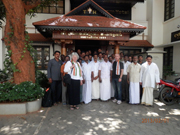MENU
Accès Affiliés
Login
Login

Private security work in India involves long hours, low pay, little access to economic advancement. The average security guard earns 5,000 Rupees a month ($100) and works 12 hour days, 26-30 days a month, many workers stand throughout most of their shift. The work is grueling. The Private Security Guards Union in Bangalore and the All Kerala Private Security Union in Trivandrum and Kochi (both in Southern India) are committed to organising security guards, building strong unions and raising standards for workers.
UNI Global Union has 3 Global Agreements that benefit our work in India—G4S, Securitas and ISS. These multinationals have the ability to influence these markets and to move private security work to the level of decent jobs. In 2011 and 2012, UNI reached agreements with G4S and Securitas to provide letters of appointment and pay stubs, to pay at least the India minimum wage, to make annual bonus payments (equivalent to a month’s pay) and to pay into the Provident Fund (public pension program). These may seem commonplace in Europe and the US but they are significant gains in India, where it is estimated that 85% of the workforce works in the informal economy.
UNI Property Services and Swedish Transport Workers’ Union representatives just returned from meeting with these and other unions in India in those cities and in Mumbai and Ahmedabad. The results of implementation are not uniform and in some areas these commitments are being violated on one or more issues. However, the overall view is that these multinationals are among the leading companies in these markets and that they have the ability to raise standards for the industry as a whole which is one of the key goals of entering into Global Agreements